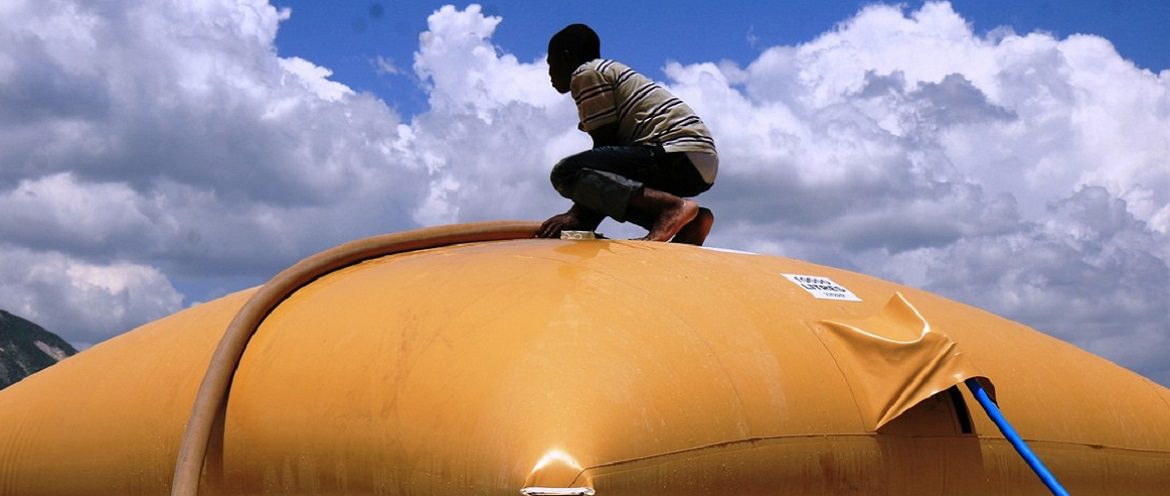
Our work advancing women’s rights, especially in situations of vulnerability, is central to Oxfam’s identity. We’re horrified by what has emerged about the abuse that took place by a group of men employed by Oxfam in the humanitarian response to the Haiti earthquake. This was a case of a group of privileged men abusing those they were meant to protect. Many of us feel betrayed by these abusers. The actions of these men do not represent Oxfam; they do not reflect the values of an organisation of passionate individuals, and our supporters, who are committed to making a difference in the world.
What happened?
The earthquake that hit Haiti on 12 January 2010 had a devastating impact on the island nation, killing more than 220,000 people and leaving over a million people homeless.
With your support, Oxfam was able to provide hundreds of thousands of people in Haiti with access to water, latrines and showers. Following the cholera outbreak in June 2011, we responded to reach people in one of the most affected zones and continued to monitor the situation in different parts of the capital and rural areas.
In 2011, some Oxfam Great Britain staff were accused of sexual misconduct and an investigation was launched. UK authorities, major donors including the EU, WHO and UN agencies, were kept informed of the investigation and its outcome and Oxfam publicly announced to media both the investigation and the action we had taken a result. But in hindsight, Oxfam Great Britain now recognises that it should have made more of the detail of the incident public, including reference to sexual misconduct.
The Country Director was permitted to resign on the basis that he fully cooperated with the investigation. Oxfam Great Britain took this decision to identify all the men involved and stop the abuse happening as quickly as possible. It is not Oxfam’s policy to allow people to resign when they are under investigation but there is very little we can do to stop it.
Oxfam has not and would not provide a positive reference for any of those that were dismissed or resigned as a result of the Haiti case. While there is nothing we can do to stop individuals falsifying references or getting colleagues to provide a reference in a personal capacity, there is clearly more that can and should be done to ensure that individuals guilty of sexual misconduct do not continue to find work in the sector.
What has changed – could this happen today?
The investigation in 2011 would not pass the standards that we have today. Oxfam has globally reviewed and strengthened its policies and practices in regard to safeguarding in the wake of the Haiti case.
Since Haiti, we have put in place a dedicated Safeguarding team, a confidential whistleblower mechanism and tightened up our policies more comprehensive policies for protecting people and empowering victims and witnesses of abuse to speak up.
But there is more that can be done. Globally, Oxfam is keen to work with the rest of the sector to overcome the barriers that had so far prevented the sharing of intelligence among NGOs and other organisations about people who have been found guilty of sexual misconduct.
A sector-wide approach is needed, as it would be impossible for any one organisation to effectively communicate with thousands of different NGOs working in countries right across the globe.
Could this happen at Oxfam Australia?
Oxfam Australia has robust systems in place to protect people from this kind of abuse.
At all times the rights of our workers, volunteers, partners and community members are paramount in our thinking and actions. We have a range of measures, mechanisms, policies and processes we use at every stage in our cycle of work – from prevention to response and caring for people who raise issues.
Policies include Child Safeguarding Policies and toolkits, A Workplace Discrimination and Harassment Policy, A Whistleblower policy and anonymous reporting platform and a Partner and Beneficiary complaints mechanism. We have Child Protection training, and staff must adhere to a Code of Conduct. All Oxfam Australia staff undergo Workplace Health and Safety training, which includes a discrimination and harassment component.
Oxfam Australia has a rigorous recruitment procedure for staff and volunteers including a police check and reference checks asking if referees know of any behaviour that would preclude a candidate working with children.
In the event that an instance of harassment or abuse is reported or that a whistleblower comes forward, we have known procedures of investigation to follow and recourse to several actions as appropriate including reporting to local authorities, reporting to Donors and taking disciplinary action.
These measures help us better protect people from abuse, sexual harassment and exploitation, and prevent it from happening in the first place. However, we know we cannot be complacent and know we need to continually improve our processes. We are absolutely committed to this work. We must look at this time as an opportunity to scrutinise our existing processes and strengthen them even further because we have an incredible responsibility to the communities we serve. We don’t take that responsibility lightly.